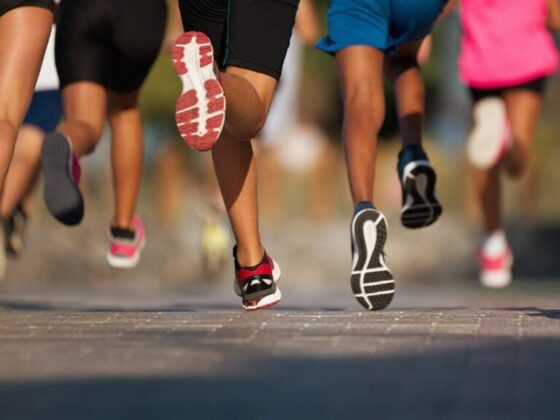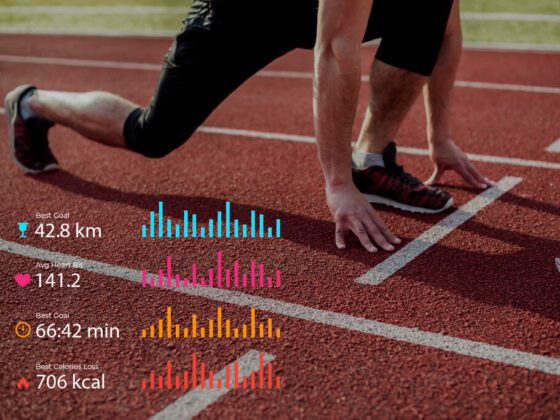This article emphasizes the crucial role of calories for marathon runners in both performance and recovery. Marathon runners burn thousands of calories during a race (estimated 4,200-6,300 for a 42km race, depending on factors like weight and speed) and need to consume 200-300 calories per hour during the race to avoid "bonking" (energy depletion). Recommended fuel sources include gels, chews, bars, drinks, and solid foods like potatoes and rice balls. Daily calorie intake in training should be 30-50 calories per kilogram of body weight, prioritizing nutrient-dense whole foods. Training runs burn fewer calories per mile than high-intensity efforts. Proper calorie management is key to successful marathon training and performance.
Table of Contents Show
For any marathon runner, understanding the role of calories is crucial for both performance and recovery. Calories are the units of energy your body uses to fuel your activities, including the demanding task of running a marathon. Adequate calorie intake and expenditure are essential for maintaining energy levels, avoiding dreaded “bonking” during the race, and supporting your body’s recovery afterward. This guide will explore the key aspects of calories for marathon runners that every athlete should know.
Related post:
- Essential Running Tips for Your First Marathon
- Tips to Increase Your Walking Speed
- The DIY Electrolyte Drink to Make For The Heat
Calories for marathon runners: what to eat
During a marathon, you’ll burn thousands of calories, making proper fueling essential. To maintain energy levels and avoid “bonking,” you need to consume calories for marathon runners at a high rate during the race.

Most experts recommend taking in 200-300 calories per hour, with a mix of carbohydrates, protein, and fat. Carbs should make up the majority to quickly replenish glycogen stores. Gels, chews, bars, and drinks are convenient calorie sources. Solid foods like potatoes, sticky rice balls, and sandwiches can also work well.
It’s also important to consume adequate calories in training and between races to support high mileage and recovery. Aim for 30-50 calories per kilogram of body weight per day, with the higher end for bigger runners and higher mileage weeks. Focus on nutrient-dense whole foods like fruits, vegetables, whole grains, lean proteins, and healthy fats.
Calorie expenditure: a guide to calories for marathon runners
The number of calories burned during a marathon depends on factors like weight, speed, terrain, and efficiency. A 68 kg runner might burn 100-150 calories per 1.6 kilometer (mile), so a 42 km race could burn 4,200-6,300 calories. Proper pacing and running economy can minimize calorie expenditure.

Understanding calories for marathon runners extends beyond race day. In training, you’ll burn 60-100 calories per 1.6 kilometers (mile), depending on your weight and pace. Easy runs burn fewer calories per mile than hard efforts. Strength training and other cross-training also burn significant calories, making them valuable for overall calorie expenditure and building a strong foundation for marathon success.
Calorie timing strategies for marathon success
Consuming calories before, during, and after a run is key. Have a small meal or snack 30-60 minutes before starting to top off glycogen stores. During the run, aim for 200-300 calories per hour, starting 30-60 minutes in. Waiting too long to eat can lead to bonking. After the run, have a recovery snack with carbs and protein within 30 minutes to start replenishing glycogen and repairing muscle damage.
Calorie sources for marathon runners

When it comes to calories for marathon runners, the best fuel sources are nutrient-dense whole foods. Focus on fruits, vegetables, whole grains, lean proteins, and healthy fats. Limit processed foods and added sugars. Some top picks include:
- Bananas, dates, raisins, fruit smoothies for quick carbs
- Oats, mixed stick rice for complex carbs
- Chicken, tuna, eggs for protein
- Nuts, seeds, avocado, olive oil for healthy fats
Supplements like gels, chews, and drinks can be useful during runs for quick energy, but whole foods should make up the bulk of your diet.
Calorie deficits: a strategy calories for marathon success
While a small calorie deficit can promote fat loss, marathon runners need to be cautious. Consuming too few calories can lead to fatigue, injury, illness, and decreased performance. Aim for a moderate deficit of 300-500 calories per day if trying to lose fat, not more. Maintain adequate calories on high-mileage days.
Conclusion
In summary, understanding calories for marathon runners is vital for both performance and health. Focus on nutrient-dense whole foods, time your calories properly, and avoid excessive deficits. With the right fueling strategy, you can maximize your marathon potential. Follow our official Facebook page now to receive more interesting information.

Subscribe
Login
0 Comments
Oldest








